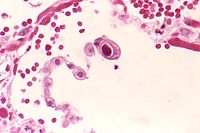
Photo from wikipedia
Cytomegalovirus (CMV) reactivation is the most frequent viral infectious complication correlating to non‐relapse mortality after allogeneic haematopoietic cell transplantation (alloHCT). The intrinsic anti‐CMV immunity has not been completely elucidated. γδ… Click to show full abstract
Cytomegalovirus (CMV) reactivation is the most frequent viral infectious complication correlating to non‐relapse mortality after allogeneic haematopoietic cell transplantation (alloHCT). The intrinsic anti‐CMV immunity has not been completely elucidated. γδ T‐cells have drawn increasing attentions due to their distinct biological features and potential ability against viral infections. Previous studies reported a general association of γδ T‐cells or Vδ2‐negative γδ T‐cells with CMV reactivation. Whereas researches for the direct responses and specific functions of γδ T subsets remain limited, especially in the scenario of alloHCT. Herein, we initially demonstrated that Vδ1+ T‐cells directly and independently recognized cell‐free CMV and CMV‐infected target cells, and inhibited CMV replication in vitro. The anti‐CMV effect of Vδ1+ T‐cells was partially through TCRγδ, TLR2 and NKG2D receptor pathways. Further investigation about the anti‐CMV characteristics of Vδ1+ T‐cells was performed in a clinical cohort with different CMV reactivation status after alloHCT. We found that occasional CMV reactivation remarkably increased the recovery levels and stimulated the functional activity of Vδ1+ T‐cells. Whereas disability of Vδ1+ T‐cells was observed upon refractory CMV reactivation indicating the differential responses of Vδ1+ T‐cells under different CMV reactivation status. CXCL10 and IFN‐β that were dramatically induced by occasional CMV reactivation could re‐activate the deficient Vδ1+ T‐cells from recipients with refractory CMV reactivation. These findings unveiled the distinct activities of Vδ1+ T‐cells in anti‐CMV immunity after alloHCT and may help develop novel strategies for the treatment of CMV infectious diseases.
Journal Title: Immunology
Year Published: 2022
Link to full text (if available)
Share on Social Media: Sign Up to like & get
recommendations!